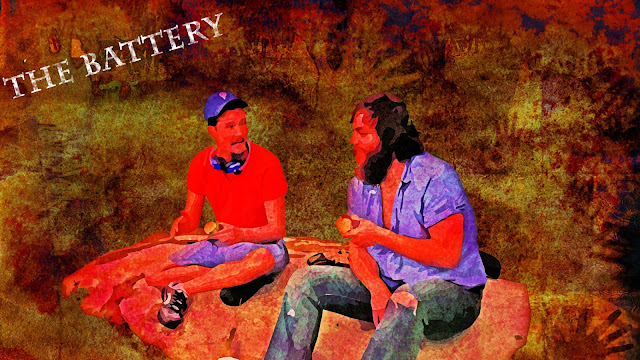The Battery Recharges Our Interest In Indie Filmmaking
In screenwriting you are told to show,
not tell; whereas in horror cinema the “rules” dictate you tell
about the threat and restrict the audience's access to seeing the
threat. The Battery succeeds
at both. Even though the film debuted at the Telluride Horror Show
last October, its recent VOD release correlates well with the
upcoming World War Z debacle.
In World War Z we
will witness millions of dollars at waste in an attempt to find the
balance between character and imminent doom, which The
Battery does perfectly with a minuscule budget of $6,000.
It is
a film that instantly reminds you of Night Of The Living
Dead, because at every moment
you feel it was a labor of love. Like Night we
have a story that focuses more on humanity than it does the zombie
threat. The nihilism of Night
is modernized in The Battery for
the millennial generation as an overall sense of apathy in the face
of hopelessness. There is no heavy-handed social commentary, nor are
there ridiculously detailed post-apocalyptic settings. We get two
baseball players attempting to come to terms with their new role as
survivors, while wandering aimlessly through the countryside.
The
realism of the film stems from the intimacy of the two characters
that are thrown together by circumstance and the friendship that
evolves as a result. They are forced by the destruction of humanity
to form a close, almost claustrophobic, relationship. Ben, played by
Jeremy Gardner (also the director), has fully taken on the role of
survivalist when the film begins. Mickey (Adam Cronheim) is
constantly at battle with his need of community or any semblance of
life as it was before. Mickey hides from the world under a pair of
headphones while Ben does everything else. Mickey's innocence and
hope may be naive, but it works as a great juxtaposition for the two
characters. Ben wants him to be able to fiend for himself, but also
enjoys the optimism that blankets innocence. Due to Mickey's
ineptitude we believe that at some point in the narrative Ben will
become food for the undead, but fortune shines down on the viewers
and we are able to fully appreciate their camaraderie.
Music
plays such a vital role in The Battery,
a lot of it can be heard digeticly through the magical and symbolic
headphones. It may appear as an instrument that would hinder
survival and Ben even remarks that the music will get them killed,
but instead it is the escape they both need. Mickey wears them and
connects with his past, while drowning out his present. Ben uses
them differently, when he puts them on there is a sense of euphoria
as if he connects only with its drug-like escapism. In a scene that
transports the viewer out of the film: Ben dons the sacred music and
sings along with the caveman baritone of Chris Eaton. He dances
about the room and belts out the lyrics; there is a primordial
catharsis taking place. Chris Eaton, the lead singer of Rock
Plaza Central, grunts and chants
a seemingly hopeful incantation about surviving against all odds.
“They
can take our fists
and
chop them off at the wrist
and we
will shake our arms with bloody stumps
and we
cannot be defeated.”
Later
when we see the title of the song in the credits, there is an
apathetic irony that adds more depth to Ben's almost random sequence.
The song is titled “Anthem For The Already Defeated,” which Ben
would have known since he sings along. So while Ben and Mickey both
use music as a form of escape we also see how the two characters
vastly differ in their perception of the crumbling world.
The Battery
may not be a film ripe for mass consumption, but most early zombie
films were not either. With films like Zombieland, Shaun
Of The Dead, and Warm
Bodies the sub-genre has
changed. These zombie-comedies have made it okay for everyone to get
into the undead. Along with The Walking Dead
they have helped to create a culture where asking, “What would you
do when the zombie apocalypse happens?” does not instantly make you
a geek. World War Z
will be the plateau and possibly the beginning of the sub-genre's
demise – at least for this current cycle. Jeremy Gardner's
experiment in micro-budget filmmaking pays off and leaves the big
budget genre films grasping for an artistic vision that only
independent features can embody.
As a
sidenote: this review was conceived prior to the release of World
War Z. If the blockbuster
hopeful is of any worth we will eat our words and retract some of our
previous statements.
Rating:
5/5
Soundtrack:
Stream selected tracks here or each of the following have a link to itunes/bandcamp





Comments
Post a Comment